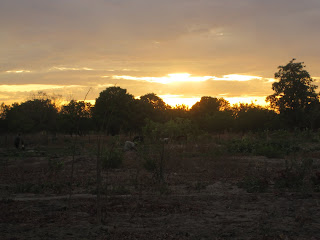Pumps restored after local men's group threatens destruction of new robinet system
In April 2011, a European NGO celebrated their completion of a brand new water tower and piped water system throughout a small village near Kita. This new system would solve all of the villagers' problems regarding clean, safe water access and would decrease the amount of time village women had to spend completing the back-breaking task of pulling well water. The best part was that villagers would only have to pay 10 CFA (~$0.02 US) per bucket of water. This money would be used to pay for any future repairs to maintain the water system.
At the official opening ceremony for the water system, all of the village members were called to celebrate. Hunters came in large numbers to shoot off their guns. Griots came to sing praise for the NGO. Women came to dance and sing. The head of the NGO had a big smile on his face as he saw that one faucet had even been installed 3 km away in a nearby village and still received good water pressure from the central water tower.
Within weeks of the opening ceremony, the local water committee decided to remove the handles of the 2 village pumps (one located near the school and one near the doctor's office) to encourage people to use the new water system. This action coincided with the drying out of most village wells as the hottest month of the year approached.
Chaos erupted. The local men's association threatened the people in charge of the water system, saying they would destroy all of the new water faucets if the pumps weren't restored by the next day. The primary reasoning for these threats being that sick patients who come to the village and all students in village should have unrestricted access to free water from the pumps.
After 2 days of intense meetings between the village men at the Dugutigi's (Chief of the Village's) house, the water association members were convinced to reopen the pumps. The young men's association immediately rescinded their threat to destroy the water faucets.
Adding to all this, the local PCV was confused with the European NGO's actions to place a new water system in village. A large water tower and associated water faucets already exists on one side of town and has been broken her entire service; the village refuses to pool money together to fix it. How is it that the best solution to the broken water system is to get a whole new water system? Further, most new water faucets do no more than 100-200 CFA business per week (10-20 buckets worth) - was this really an appropriate project for the village? After all, even the local PCV is too cheap to pay 30 CFA ($0.06 US) per day for her 3 buckets of water, which she chooses to get for free at the pumps.
Local association leader lies openly to Spanish NGO
Approximately 3 years ago, a very well-meaning Spanish NGO provided farming and gardening equipment to a local women's association. Included in this equipment were shovels, watering cans, buckets, a plow ("traditional", cow-led), and a donkey cart. This Spanish NGO is well known for providing school supplies for local children, benches for classrooms, and building schools and maternities in the area. In many ways, they are one of the most active NGOs in the commune (similar to a US county).
Since the materials were received 3 years ago, they have been sitting at the house of the traditional women's group leader. Members of the government-recognized women's association frequently complain that the materials were "stolen" from them by the traditional leaders of the village.
During the last 2 weeks, representatives of the Spanish NGO visited the village to check on the progress and impact of their work and to plan for future projects in the area. Prior to their arrival, the local PCV and women's President had the following discussion:
President: Aminata, the Spanish NGO is coming to ask what we have been able to achieve with all of the materials they gave us 3 years ago. The traditional women's leader asked me to speak to the NGO representatives on her behalf at their welcoming ceremony.
PCV: Oh, wow. But all of those materials are just sitting at her house and have not been utilized. What are you going to say to them?
President: I am going to lie. I am going to say that we have used all of the materials for both farming gardening, and that they have greatly increased the quantity and quality of our harvest. I am going to give them many blessings and tell them how happy we would be if they gave more materials to us and the surrounding villages.
PCV: So, you're really going to lie to them?
President: Of course I am, they'll never know.
The local PCV left this conversation with 2 thoughts:
1. How many times have I been lied to in the past 2 years and not realized it? (There have been many times that I did realize it)
2. Knowing that my response might cause the NGO to provide me with more free materials, wouldn't I lie too?













